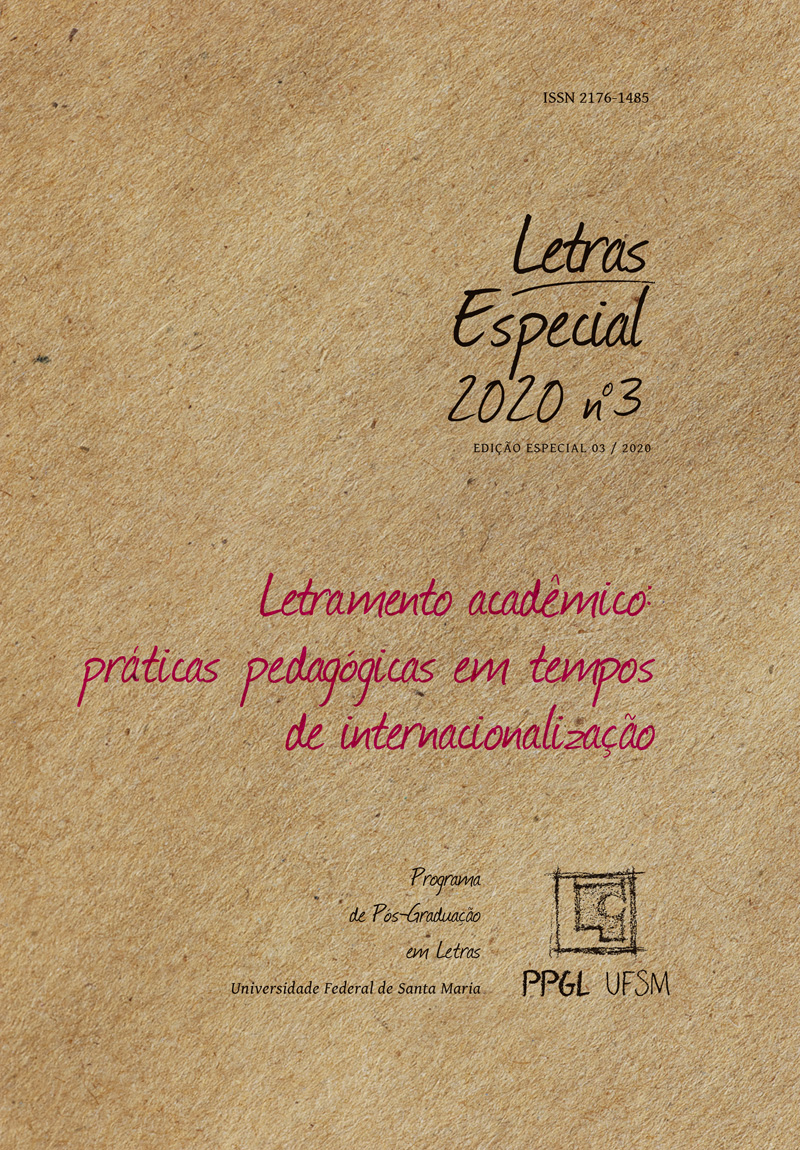ENHANCING ACADEMIC LITERACIES THROUGH EMI TRAINING: THREE PERSPECTIVES ON TEACHING TOWARDS THE CERTIFICATE IN EMI SKILLS AT THE UNIVERSITY OF SÃO PAULO
DOI :
https://doi.org/10.5902/2176148548371Résumé
In many Brazilian universities, internationalization policies have led to increased pressure on academic staff to offer courses using English as a Medium of Instruction (EMI). In 2019, in order to offer support to staff adopting EMI, the University of São Paulo partnered with Cambridge Assessment English to pilot a Certificate course in EMI Skills. This partnership offers advantages but raises questions about the adaptation of a standardized international course and certificate in EMI skills for a specific institution. The present paper offers three perspectives on the pilot course – from the provider, an instructor, and the participants – and discusses their implications for USP and other Brazilian institutes of higher education.
Téléchargements
Références
ARCHANJO, R. (2016). Saberes sem Fronteiras: Políticas para as migrações Pós-modernas. DELTA: Documentação de Estudos em Lingüística Teórica e Aplicada, 32(2), 515-541. https://doi.org/10.1590/0102-4450790718885409696
BARROS, H. et al. 2012. Cem Mil Bolsistas no Exterior. Revista Interesse Nacional 5 (17), 11 p. Available at: < http://www.schwartzman.org.br/simon/cemmil.pdf>
BORGES, R. A.; Garcia-Filice, R. C. (2016) A língua inglesa no Programa Ciência sem Fronteiras: paradoxos na política de internacionalização. Interfaces Brasil/Canadá. Canoas, v. 16, n. 1, 2016, p. 72–101. Available at: <https://periodicos.ufpel.edu.br/ojs2/index.php/interfaces/article/viewFile/7516/5615> Accessed on 20th July 2020
CAE (2018) Cambridge English Teaching Framework. Available at: <https://www.cambridgeenglish.org/teaching-english/professional-development/cambridge-english-teaching-framework> Accessed on 20th July 2020.
CAE (2020a) Certificate in EMI Skills. Available at <https://www.cambridgeenglish.org/teaching-english/teaching-qualifications/institutions/certificate-in-emi-skills/about-the-course/> Accessed on 20th July 2020.
CAE (2020b) Inglês como solução para sua estratégia de internacionalização. Available at: <https://www.cambridgeenglish.org/br/cmp/internationalisation> Accessed on 20th July 2020
COLLINI, S. (2017) Speaking of Universities. London: Verso
DEARDEN, J. (2014). English as a medium of instruction-a growing global phenomenon. Manchester: British Council.
DORIGON, T. (2016). O Programa Idiomas sem Fronteiras Analisado a partir do Ciclo de Políticas. BELT - Brazilian English Language Teaching Journal, s4-s20. https://doi.org/10.15448/2178-3640.2015.s.21009
ENTWISTLE, N., & RAMSDEN, P. (1983) Understanding Student Learning. Beckenham: Croom Helm Ltd
KENNEDY, K.J. (2011) Conceptualising quality improvement in higher education: policy, theory and practice for outcomes based learning in Hong Kong, Journal of Higher Education Policy and Management, 33:3, 205-218, DOI: 10.1080/1360080X.2011.564995
LONG, E. (2020) Have we got the lecturing lingo? Supporting academic teaching staff delivering content through the medium of English: A case study. ResearchNotes, 77, 20-28. Available at <https://www.cambridgeenglish.org/Images/580394-research-notes-77.pdf> Accessed on 20th July 2020.
MENEZES de SOUZA, L. M.. Políticas de Internacionalização na Educação Superior: questões e caminhos. ICCAL – International Congress of Critical Applied Linguistics: Language, Action and Transformation. Brasília, 19-21 Oct. 2015
MULHERN F. (2020) In the Academic Counting-House. New Left Review. May 1 (123), 115-32.
OLIVER, B., JONES, S., FERNS, S., & TUCKER, B. (2007) Mapping curricula: ensuring work-ready graduates by mapping course learning outcomes and higher order thinking skills. ATN Evaluation and Assessment Conference: assessment and evaluation for real world learning. Brisbane: Department of Teaching and Learning Support Services, Queensland University of Technology, 103-110.
OLIVER, B., & JORRE DE ST JORRE, T. (2018) Graduate attributes for 2020 and beyond: recommendations for Australian higher education providers, Higher Education Research & Development, 37:4, 821-836, DOI: 10.1080/07294360.2018.1446415
POULTER, M. (2003). Cambridge ESOL Teaching Awards: current perspectives, future trends. ResearchNotes, 14, 2-3. Available at <https://www.cambridgeenglish.org/Images/23129-research-notes-14.pdf> Accessed on 20th July 2020.
Téléchargements
Publiée
Versions
- 2022-07-04 (2)
- 2021-10-19 (1)







